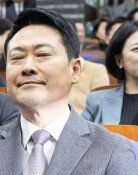Presidential Candidates from Ruling Party Still Have Low Popularity
Presidential Candidates from Ruling Party Still Have Low Popularity
Posted April. 30, 2007 03:43,
Even though the main opposition Grand National Party (GNP) suffered a great defeat in the by-elections on April 25, the benefit other parties gained from this doesnt seem to be significant.
According to a survey conducted by Dong-a Ilbo and the Korea Research Center (KRC) last Saturday, peoples preferences for presidential candidates from the ruling party did not change compared to the results of the fourth survey conducted on March 29.
The popularity rating of former Gyeonggi province governor Sohn Hak-kyu is 6.4 percent, just barely up from 6.0 percent last month. Meanwhile, former Seoul National University president Chung Un-chans rate climbed to 2.2 percent from 0.5 percent, yet it is too early to make too much of this because his share is extremely low right now.
Other candidates such as former Uri Party chairmen Chung Dong-young and Kim Geun-tae, and former Prime Minister Han Myeong-sook remain somewhere around 1 percent in terms of popularity rating.
Former Gyeonggi governor Sohn, who left the GNP on March 19 after saying, I will go to Siberia, had a hard time recently due to conflicts among his supporters, but seems to be starting to consolidate his position as an independent candidate.
Meanwhile, for months, former Seoul National University president Chung Un-chan has kept quiet about whether he will run in the election.
In fact, it is practically impossible right now for other candidates from the ruling party to create ways to increase their popularity ratings.
However, some are starting to make moves to try and do so, and many people even mention the Big Bang of May as a time when ratings can spike.
The outcome of the by-election proved that the GNP isnt unrivaled. Collaboration with political figures outside the GNP will make neck-and-neck races in the presidential election at the end of this year possible.
However, the point is who can lead this initiative.
Regarding this, there are a couple of scenarios. One is Chung-Chung-Sohn Solidarity, which seeks the collaboration of Chung Dong-young, Chung Un-chan, and Sohn Hak-kyu, or the Western Regions strategy, which appeals to voters in Honam, Chungcheong, and Gyeonggi (western parts of the peninsula). The other is Reformative Solidarity which seeks the collaboration of former Uri Party chairman Kim Geun-tae and lawmaker Chun Jung-Bae who devotes himself to groups that work for the improvement of peoples livelihoods.
Recently, Min Byeong-du, a lawmaker of the ruling Uri Party, said that, If Chung Un-chan decides to run in the race in collaboration with forces from civic sectors, anti-GNP forces will be mobilized.
Considering how close the presidential election is and the termination of tenure of the Uri Partys executive members set for June 14, it is likely that the ruling party will attempt to come up with a plan by the end of May.
yongari@donga.com







